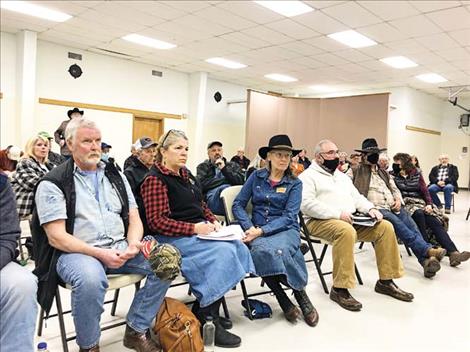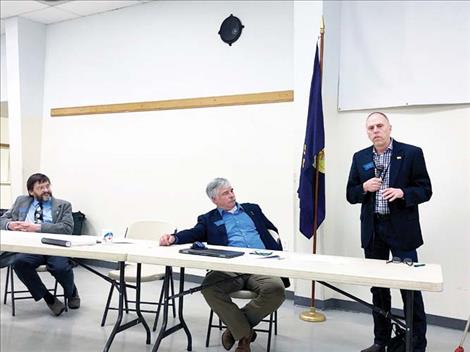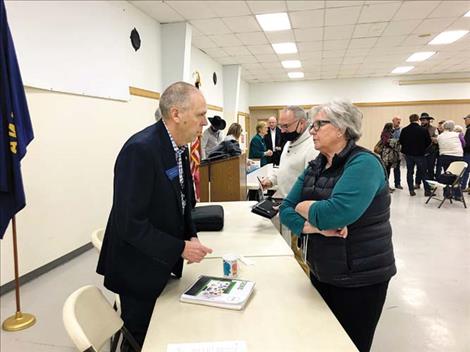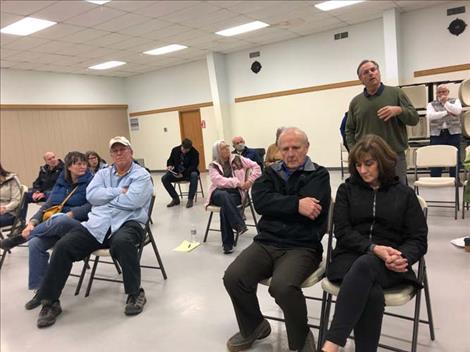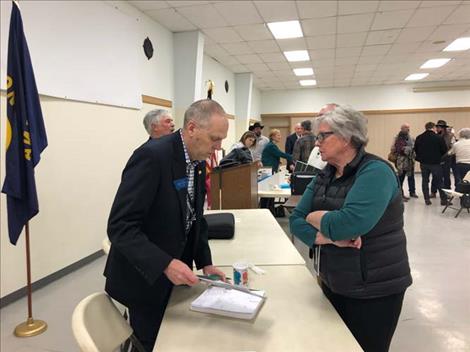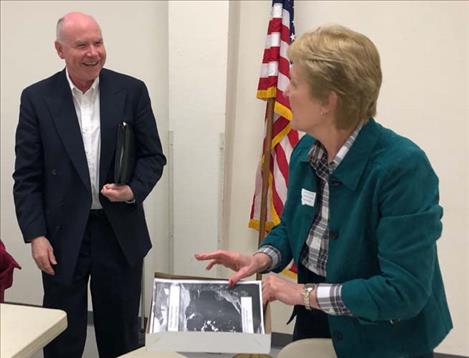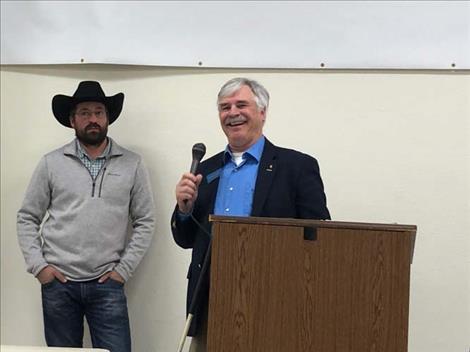County residents gather to hear legislative updat
Hey savvy news reader! Thanks for choosing local.
You are now reading
1 of 3 free articles.
Five Lake County legislators faced a supportive crowd last Thursday evening during a legislative update at the Ronan Community Center.
The event, which occurred during the mid-session break, drew an estimated 70 people to the center, plus around 25 who tuned in via Zoom. The Northwest Counties Farm Bureau co-sponsored the forum with the Lake County Commissioners, Lake County Democrats and the Lake County Republican Central Committee. Josh Senecal, president of the Northwest Counties Farm Bureau, moderated the live session, while the commissioners’ executive assistant, Kate Stinger, ran the online portion.
Members participating from the House of Representatives were Mark Noland (HD10); Joe Read (HD93) and Linda Reksten (HD12). On the Senate side were Greg Hertz (SD6) and Dan Salomon (SD47).
During the two-and-a-half hour session, the all-Republican lineup was plied with questions about taxation, tribal jurisdiction, education and housing, and they fielded queries about more controversial measures that would limit transgender rights and voting access and loosen gun regulations.
Early in the evening, Rep. Read was asked about the fate of House Bill 241, which would have allowed big-game hunting on private property within the boundaries of a reservation. The bill, which aroused the ire of every Indian nation in Montana, was tabled 13-5 in the Fish, Wildlife and Parks Committee.
“Every tribe in the state came out in force against it and said we were walking all over their tribal culture,” Read said. “It pretty much went south from there.”
Read predicted that the issue would come up again. “The private property right is still there,” he said. “Certainly we’re going to have to address it.”
Gerry Browning, of Polson, asked Rep. Reksten, a former educator, to justify her vote on three controversial pieces of legislation that allow students to carry guns on college campuses (HB 102), prevent transgender females from participating in women’s sports (HB 112) and remove local governments’ authority to regulate vaping and e-cigarettes (HB 137).
The so-called “constitutional carry” bill, signed into law by Gov. Greg Gianforte last month, allows Montanans to carry concealed firearms in public settings, including banks and bars, without a permit, and limits university officials’ ability to restrict firearm possession on college campuses.
“It was felt – and I stand by it – that a concealed carry is a safety measure and that colleges can regulate the policy,” Reksten said.
As to HB 112, which says that athletes at Montana schools and colleges can compete only on teams that align with their gender at birth, Reksten at birth, Reksten contends that allowing individuals who were born as boys to compete as girls “would kill women’s sports.”
“We can’t allow transgender males to compete against females – they are twice as fast, twice as strong,” she said.
She was also unapologetic about supporting HB 113, which would prohibit anyone under 18 from getting medical treatment or surgery for a sex change. She said a doctor testified to the House that 80 percent of kids with gender issues “self-correct.”
“Who puts the idea that there’s a gender problem in the minds of kids if it isn’t adults?” she asked.
Rep. Noland took over on legislation that prevents local governments from regulating alternative nicotine products. He pointed out that businesses still have the option of banning the use of those products on their premises and that those products still can’t be advertised to youth.
“Personally, I don’t like e-cigarettes and smoke,” he said. “But society does and society has said we want to allow this.”
Members of the audience also brought up “liberty of conscience” bills, with some questioning why Sen. Salomon had voted against the Montana Religious Freedom Restoration Act (SB 215). Proponents say the bill will ensure Montanans’ right to religious freedom, while opponents say it could lead to discrimination, especially of LGBTQ people.
Salomon cited concerns that Montana could lose substantial federal funding and suffer other economic repercussions if that bill and the legislation limiting transgender participation in sports were enacted. “I agree with religious freedom,” he said. “The fact that they could shut this state down economically, I disagree with. That’s the last thing this state needs right now.”
He applied similar logic to opposing HB 112 and its impact on Title IX funding. “I don’t want one gender competing against another,” he said. “But I don’t want to risk $500 million in education money in Montana for that bill; I don’t think that’s a very good trade out. That’s 200,000 students that we’re putting at risk.”
“It’s not always about the bill,” he added. “It’s about the reaction to it and all the things that could happen because of it.”
Audience members also asked why he had opposed legislation by Sen. Theresa Manzella, of Hamilton, that would make it easier to exempt kids from childhood immunization requirements.
Salomon, a former school board member who currently chairs the Senate Education Committee, said he fully supports parents’ rights to oversee their children’s healthcare. “But there are consequences … You don’t want to vaccinate your kids, but that puts every other child at risk, so whose rights are we really talking about here?”
Chris Morigeau, of Ronan, noted that politicians had campaigned on improving the economy. “But most bills I’ve seen so far have attacked abortion, LGBTQ rights and Indians,” he said. “I’m curious what bills, specifically legislators, are bringing to help residents in Lake County, aside from going after the tribe.”
In response, Read mentioned HB 594 which would exempt the Department of Natural Resources from conducting environmental reviews for grant projects on private, county or municipal lands that are aimed at conserving habitat, reducing wildfire risk or improving forest health. The bill passed to the Senate along party lines.
Salomon mentioned the passage of SB 65, which limits the liability of businesses, healthcare providers and nonprofits related to the COVID-19 pandemic. He also touted efforts to improve broadband access across the state and encouraged energy development.
Hertz, who is vice chair of the Senate Taxation Committee, is working closely with Gov. Gianforte to cut the income tax rate by two percent (an estimated loss of $30 million in state revenue). The move, he said, would help make Montana more competitive with its neighbors, who all (with the exception of Idaho) have lower income tax rates or none (although most are augmented by a sales tax).
“When businesses are looking to relocate their number-one issue is income taxes,” said Hertz, “so we’ve got to get that down.”
Other measures aimed at improving the economy include reducing the business equipment tax on purchases up to $200,000, which would impact up to 4,000 small business owners and authorizing a “media credit” to attract the film industry.
The state needs to “open our arms and welcome” the tech industry and the higher-paying jobs it can bring, he said.
A member of the audience asked how the state would make up for the lost revenue caused by tax cuts, especially in light of declining income from natural resources.
“All of those agencies have little pots of money and it’s our job as legislators to find those little pots of money and see if we can use them more efficiently,” replied Read, who sits on the House Appropriations Committee. “That’s how we can lower taxes and still keep services in line.”
Other topics:
Affordable housing: Rexsten said the House has passed a bill that makes $15 million from the Coal Severance Tax Trust Fund available for low-income housing. She worries, however, that the fund itself – which supports 13 programs – is dwindling as revenue from coal vanishes and suggested that the Legislature needs to explore other ways to shore up its income.
Hertz said the Senate is working on ways to streamline subdivision review and make planning guidelines “more predictable.”
“We need more houses,” he added. “It’s a supply and demand thing. The more houses you have, the less expensive they are.”
He also urged cities to allow more trailer courts since mobile homes “are one of the least expensive forms of housing available and have basically been outlawed in most parts of the state.”
Alternative energy: Asked how to encourage wind and solar development, Hertz said he was against a bill that would increase taxes on renewables. “That just doesn’t make us competitive.”
He said that Montana’s personal property taxes for pipelines, power lines and telecom infrastructure “are the highest in the Rocky Mountain region,” which makes it expensive to deliver the energy produced here to larger markets.
“We need every kind of energy that we can get,” he added. “But we also need to make sure that when the wind’s not blowing and the sun’s not shining, we’ve still got power.”
Education: The governor signed HB 15 Friday, which will help increase the starting salary for new teachers. Salomon, who helped shepherd the legislation, noted that it was a priority for the new governor.
While the average teacher’s salary in Montana ranks 27th in the nation, starting salaries are 50th – “in other words, we’re dead last.” The new funding mechanism gives school districts a means to address that disparity.
Rexsten sponsored a bill, which drew support from both Republicans and Democrats, that should make it easier for districts to finance capital improvements. The legislation was inspired by her efforts to replace Cherry Valley Elementary’s aging boiler while serving as school superintendent in Polson.
She also supported HB 46, which increases funding for Special Education; another measure that pays schools to educate “the handful of kids who need extra time” through age 19; and a bill that helps fund successful youth recovery programs, including Youth Challenge in Dillon, the Yellowstone Boys and Girls Ranch in Billings and Shodair Children’s Hospital in Helena.
Hunting: Hertz noted that he received an estimated 5,000 emails regarding SB 143, which aimed to allocate a certain number of nonresident hunting licenses to outfitters. Of that barrage, he said, “only about 100 came from Montana residents. The rest were from non-residents, asking ‘why are you taking my hunting rights away from me?’”
Outfitters and their customers typically spend five times more in Montana than “do-it-yourself” non-resident hunters. In addition to its economic benefits, Hertz believes the bill would help protect resident hunters, “whose biggest complaint is that there’s too damn many out-of-state license plates at my favorite hunting spot,” and aid those outfitters who rely on revenue from guided hunts to keep a ranch in the family.
Election security: Lisa Pavloch asked why the Legislature was passing bills that would restrict mail-in voting, limit the types of identification voters need when casting their ballots, and end same-day voter registration, even though there is no evidence of statewide voter fraud in Montana.
Noland responded that all are designed to preserve “the sanctity of the vote … We want our votes counted and we want our votes protected,” he said.
Government overreach: Government intrusion at the federal, state and local level was a recurring theme throughout the evening. A number of audience members asked how Montana could wean itself from federal oversight. “We’re working on that, but it’s going to take some time,” said Read. “We have to open up our economy first.”
In response to concerns that former Gov. Steve Bullock was given sweeping powers during the pandemic, Hertz said the Legislature is working to limit the governor’s ability to override state statutes and regulations in the case of an emergency declaration, and require the chief executive to seek legislative approval to continue the declaration beyond a certain time limit. The existing statute “was big enough to drive a freight train through,” he said.
Polson City Commissioner Graydon Moll accused the Legislature of “trying to control things at the local level” by limiting the ability of local jurisdictions to pass certain regulations.
“We don’t have a lot of tools in our tool kit to do things,” he said. “What can you do to help us?”
Hertz replied that, although he believes “the best decisions are made at the local level,” the Legislature was “overruling local governments because they’re just overreaching.”
He added that without a sales tax, which Montanans continue to reject, revenue options for local governments remain limited to income and property taxes. “Pick your poison,” he said. “You can either spread it out or stick with two taxes.”
Across the board, legislators were pleased to be working with a Republican governor for the first time in recent history.
“We’re so excited to have Gov. Gianforte,” said Noland. “If he’s successful, it’s going to help our entire state get our economy going and get us back to our lives.”















